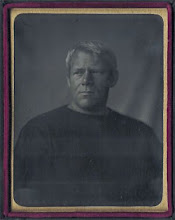 Canadian Pianist Glenn Gould Playing Concert Grand Piano as He Records Bach's Goldberg Variations in Recording Studio
Canadian Pianist Glenn Gould Playing Concert Grand Piano as He Records Bach's Goldberg Variations in Recording Studio1955
- Joe Sarno
I first encountered a vintage print of this image at G.Ray Hawkins' Gallery on Melrose in Los Angeles. It was probably the late 1980s. I've always admired Glenn Gould's landmark recordings of Bach's Goldberg Variations. I thought this picture captured some of Gould's eccentric genius. If you look closely, you'll notice that Gould has kicked off his shoes and is playing the piano in his stockinged feet, hunched over the keyboard in that inimical way he had. But there are two pairs of shoes! I always wondered: did Gould start recording earlier and go home that night in just his socks, only to return the day this picture was taken, wearing a new, second pair of shoes??
The print of this photograph ranks high on my list of The Pictures That Got Away. I should have bought this print on the spot, but for a variety of reasons (excuses, excuses), I didn't. But I know where it ended up. Almost a decade later, I discovered this very print up in Toronto, Canada. I always thought it was fitting that this image of Gould returned to Canada.
- Peter Hay Halpert

No comments:
Post a Comment